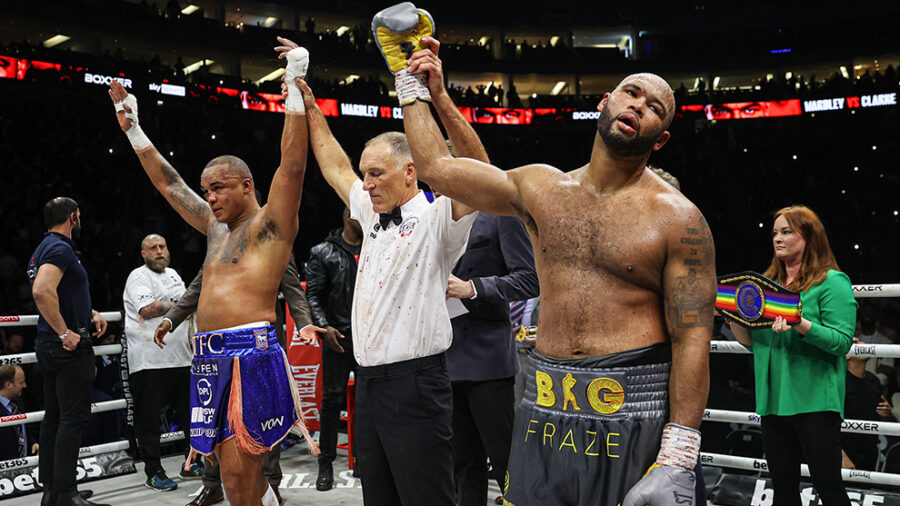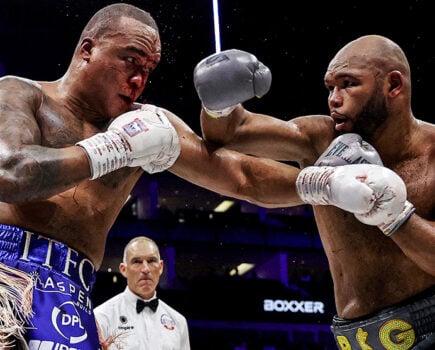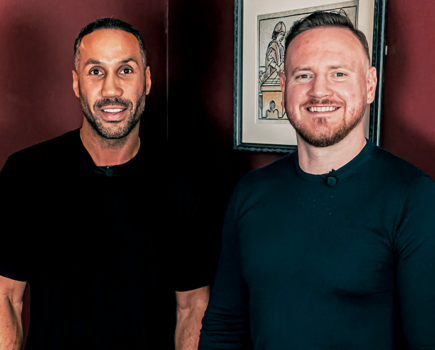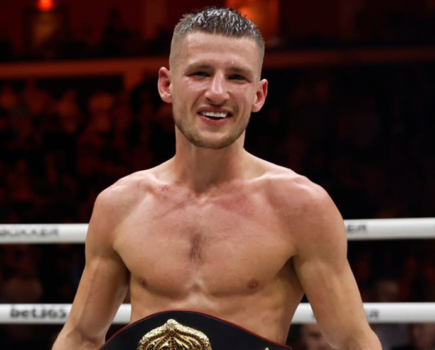By Elliot Worsell
WHILE it would be both easy and forgivable to say a draw is always a disappointment following 12 rounds of quality action, far better is it, in the case of Fabio Wardley vs. Frazer Clarke, to instead see tonight’s (March 31) result as a testament to the competitive and compelling nature of the heavyweight fight they produced at London’s O2 Arena.
With Wardley’s British and Commonwealth titles on the line, the two men, rivals beforehand, shared everything this evening: exchanges, blood, shifts in momentum, the lot. It seemed almost fitting, in fact, that having shared so much for 36 minutes they should at the end of the fight, when standing either side of referee Steve Gray (whose shirt was tainted by Wardley’s blood), go home with the same emotions: disappointment, regret, relief. After all, though neither man will be satisfied with the outcome (a draw by scores 114-113 Wardley, 115-112 Clarke, 113-113), there is no worse feeling than enduring a gruelling affair like tonight’s only to come away empty-handed, your effort ultimately futile; wasted.
At least with a draw both men remain unbeaten and both have an incentive to fight again in the future. Selfishly speaking, that would make the draw the ideal outcome, for a fight this good surely needs to be seen again. Moreover, a rematch between Clarke and Wardley would be even more intriguing by virtue of them having now both gone the full 12 rounds for the first time in their respective careers.
That, in truth, was the opponent the pair of them were battling tonight, with the concern often evident in a look or the desperate lunge of a right or left arm. To conquer the fear, both wanted to have their opposite number obey and fight their kind of fight. Clarke wanted a slow-paced amateur fight, during which he could take his time to pick his shots and control matters with his jab; whereas Wardley, on the other hand, wanted to drag Clarke into his kind of fight: one of the white-collar variety.
That’s not to say Wardley, who cut his teeth on the white-collar circuit, is an unruly dilettante, but certainly there is a ruggedness and unorthodoxy to Wardley’s attacks and indeed attitude which was always going to be threatening – the antidote of sorts – to someone like Clarke, who is so very prescribed, well-schooled and at times one-paced.
This distinction between the two heavyweights made for some quite brilliant action throughout and never once was it easy to see which of the two would go on and grab a foothold in the fight. Early on, for example, it appeared as though Clarke’s better seasoning and more effective jab would be decisive and allow him to forge some kind of lead. Then, however, Wardley came out fast in round two, as if to shake Clarke from his comfort, and later in that same round landed a wild right which buzzed Clarke for the first time in the fight.
The only downside for Wardley, mind you, was the cost of these exchanges, for now he would have to navigate the rest of the fight with a cut on his nose, which bled respectfully in the second and third rounds, but then gushed rather dramatically the longer the fight progressed. In fact, so bad was this cut, one started to wonder how Wardley would handle the injury and whether the referee, Steve Gray, would even allow the injury to be handled.
Thankfully, though, Wardley showed few signs of being disturbed by the blood running down his nose. If anything, he would use it as motivation, the sight of it only increasing the overall sense of urgency.
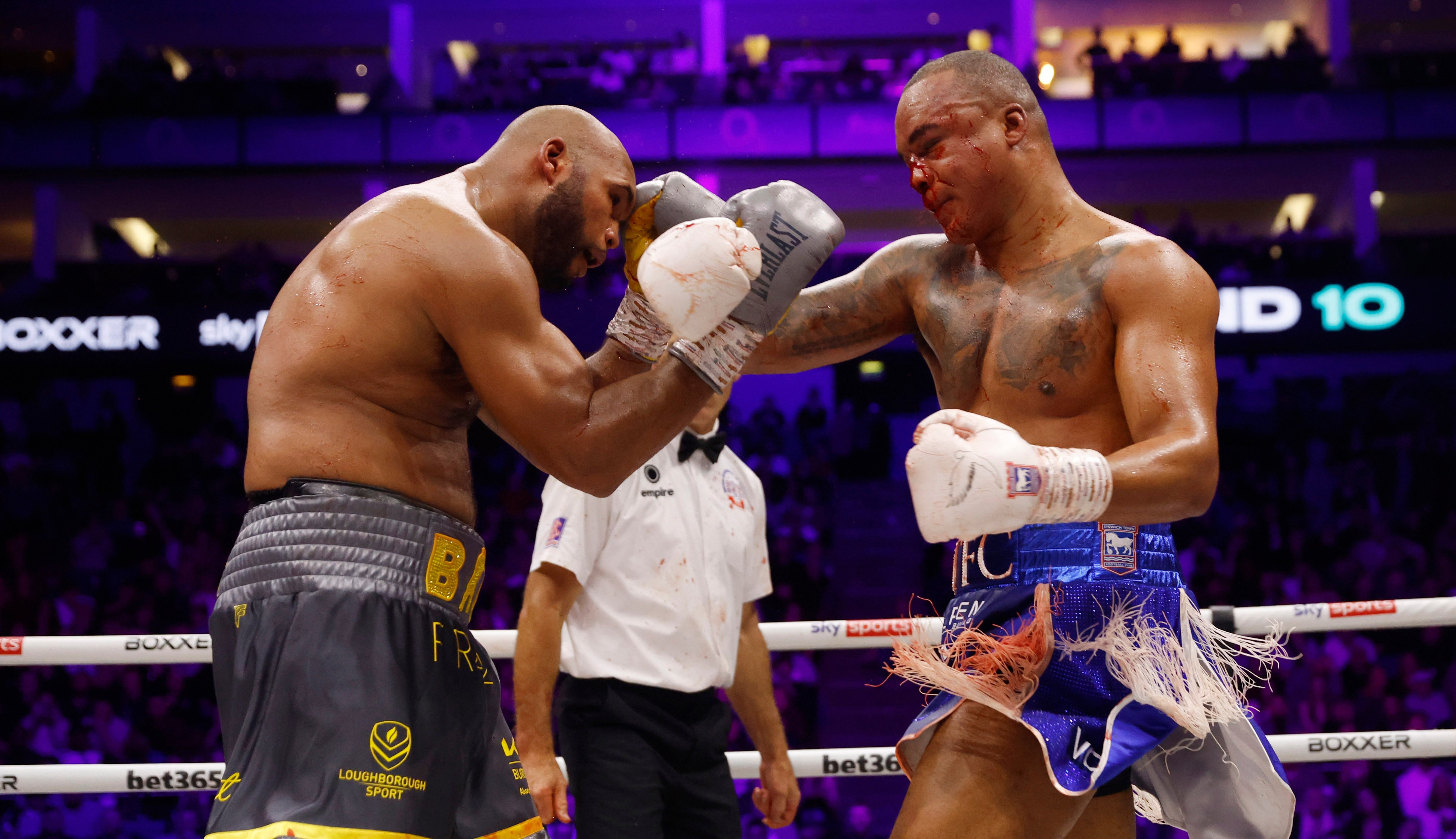
Wardley aims a right at Clark (Lawrence Lustig/Boxxer)
In round five, Wardley unsettled Clarke once again with a right hand – this time a pull-back right hand – and, such was the impact of the shot, he chased a finish despite there being only 30 seconds left in the round. Enough in Wardley’s eyes, he set about Clarke the second he realised he was hurt and, following a fusillade of punches, managed to eventually put him on the canvas – Clarke more in need of an escape than anything – with around 10 seconds remaining in the fifth.
Clarke rose, of course, but was disappointed all the same. He was disappointed to have been caught like that and disappointed, furthermore, to have been pictured on the canvas in the presence of someone he has for a while considered a rival.
Still, that’s just vanity. Far more important was how Clarke reacted to this knockdown and, to his credit, he reacted to it well, killing much of Wardley’s momentum in the subsequent round, the sixth, and rediscovering the composure he had momentarily lost in round five. By now Clarke was having a field day with his right uppercut, a pet punch of his since round two, and time and time again he landed this shot with Wardley’s elbows far away from his torso, thus leaving an opening for it.
Even so, tiredness was just around the corner, a sense of which had them both dropping their output somewhat in the seventh. There was a reduction in quality, too, what with them both being exhausted, and this showed in Clarke’s body shots, which had been getting progressively lower and sloppier but then, in round seven, led to him having a point deduction, which proved to be crucial in the end. Now, with Clarke dropped in round five and docked a point in round seven, he was effectively playing catch-up in a fight in which he was otherwise doing okay.
As for Wardley, he had other things to worry about. Seven rounds down, he was entering uncharted territory and the prospect of this could be seen in his desperation to land shots in round eight. With no idea of when, or if, his second wind would arrive, one got the impression Wardley just wanted to end matters there and then. He wanted to buzz Clarke again with a right and this time get the job finished and go home.
Clarke, meanwhile, showed admirable composure. It won him the eighth and also the ninth, a round in which Wardley started showing distress signals: nose bloodier than before, slipping momentarily on the canvas, unsteady on his feet. Perhaps sensing this, too, was the referee, who invited the ringside doctor to inspect Wardley’s awful cut in round 10.
This ended up being an interesting flashpoint, in fact, because upon the restart Wardley, having had a few seconds to rest and reload, landed a huge right hand on Clarke which sent the challenger spiralling once more. Then, as if to get his own back, Clarke just as soon lost his gumshield, which in turn meant he would also get a timeout, one he very much needed given the damage done to him by Wardley’s right cross.
Damage, by now, was the word; for both. Tiredness, also. That was something plain for all to see, especially with both now breaking new ground in round 11. In this round Clarke, familiar only with round 10 before tonight, found himself mostly outworked, even if the work was more white-collar than anything particularly artistic. He then, however, summoned enough strength in the last round to hurt Wardley for maybe the first time in the fight, landing his own right hand with the Ipswich man dilly-dallying by the ropes.
Still, it was not enough. Despite feeling as though he had given everything (so much so that after the fight he sat on the canvas before a stool could even enter the ring), Clarke, and also Wardley, had somehow not done enough. For a boxer, there can be no more demoralising feeling, yet then you remember that neither man lost.
Better yet, not only did they avoid defeat, but Wardley and Clarke continued something of a purple patch for British title fights in 2024 and more than did enough to warrant both the pre-fight hype and a future rematch. In fact, while watching the pair box this evening at the O2, one couldn’t help but imagine combining the pair’s respective attributes to create a fighter capable of going beyond domestic level and perhaps winning world honours. Imagine it: the composure and technical skills of Clarke, now 8-0-1 (6), combined with the toughness and raw power of Wardley, 17-0-1 (16). Truly a perfect match.

